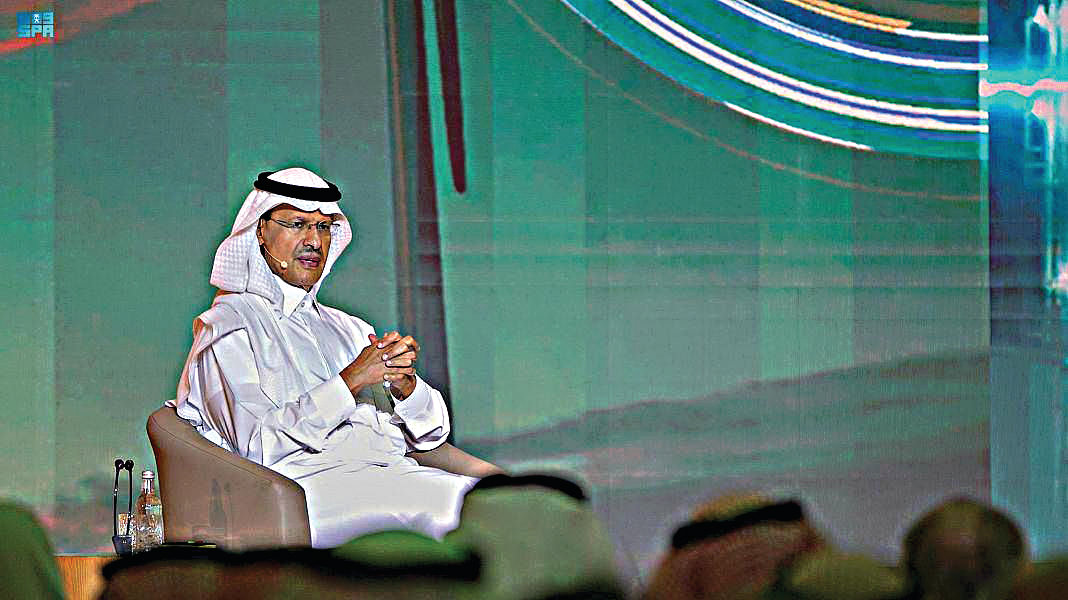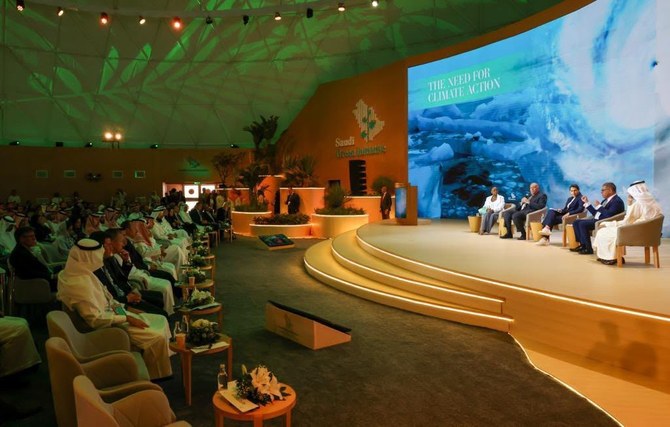SHARM EL-SHEIKH, Egypt: Saudi Arabia’s Minister of Energy Prince Abdulaziz Bin Salman at COP27 inaugurated three new projects and a greenhouse gas credit scheme to launch next year, further enhancing the Kingdom’s action on climate change.
The announcement came on the second day of the second Saudi Green Initiative Forum, held on the sidelines of the UN Climate Change Conference in Egypt’s Sharm El-Sheikh resort town.
The forum addressed climate challenges in the Kingdom as well as the plans and achievements of 39 Saudi stakeholders committed to achieving the Saudi Green Initiative goals and Vision 2030.

Saudi Arabia’s Minister of Energy Prince Abdulaziz bin Salman at the COP27. (SPA)
As part of its commitment to the Middle East Green Initiative, the Kingdom is launching the Circular Carbon Economy Knowledge Hub. The platform will facilitate regional collaboration in circular carbon economy technologies, and share the information, best practices and learnings to support the region-wide implementation of NDCs, helping achieve ambitious targets.
“Saudi Arabia is working with the UN Economic and Social Commission for Western Asia to establish a regional center to advance emissions reduction. This center will provide opportunities for regional collaboration to accelerate emissions reduction and facilitate the implementation of the CCE. It will also be a powerful platform to represent regional voices, influencing global narratives and developing a road map to lower emissions,” the Ministry of Energy said.
The Kingdom is also working with the UN Framework Convention on Climate Change to host the next MENA Climate Week in 2023, set to take place in the run-up to COP28 in the UAE. The event will bring together key regional and global stakeholders to explore challenges and opportunities, as well as showcase innovation and solutions.
Commenting on Saudi Arabia’s climate initiatives and approach to cross-border collaboration, Adel Al-Jubeir, Saudi envoy for climate affairs, said: “We all inhabit this planet together. What happens in one part of the world affects other parts of the world — we can’t escape that. The issue of climate change doesn’t recognize borders or genders, or religion. We have to all chip in to do this. Saudi Arabia is the world’s largest exporter of petroleum and so we also have a responsibility in that sense … we have to take a leading role.”
He added: “The objective is to plant up to 50 billion trees in the Middle East and his royal highness also announced the funding of $2.5 billion of support to activities of the initiative, to make sure we deal with desertification and deal with planting trees in order to reduce carbon in our environment. We’ve also launched funds that deal with food security and funds that deal with helping countries manage the transition using a circular carbon economy approach … we want to be an example to the world in terms of what can be done. We believe it can be done, we believe it will be done and we are determined to do so.
“You either get ahead (of climate change) or you are going to be buried by it. Saudi Arabia is committed to being ahead of it. When you look at many of the world problems, or potential problems, they have to do with climate change, whether there is not enough food or not enough water. These become sources of conflict and we need to get ahead of this, in order to eliminate them and to provide a better future for our children and grandchildren.”
During the forum, Prince Fahad Bin Jalawi signed the UNFCCC Sport For Climate Action Framework to make the the Saudi Olympic & Paralympic Committee an official signatory.
Prince Fahad expressed his gratitude to the prominent efforts of the Saudi Green Initiative under the leadership of Prince Mohammed Bin Salman toward encouraging climate action and sustainability in Saudi Arabia.
“The climate crisis is a call of action for all of us to combat climate change through all levels. SOPC is working to expand the scope of climate actions in the Kingdom to be extended to the sport level, to contribute in finding solutions for the climate crisis in and through sport at the international, regional and national levels.”
He added: “It is our responsibility to spread awareness about the climate issues and address them through sport as well as join the forces of all sport organizations in the Kingdom to play a vital role that helps achieve the goals of the Saudi Green Initiative and Vision 2030.”
UAE Minister of Climate Change and Environment Mariam Almheiri, who spoke on the sidelines of the Saudi Green Initiative Forum, said throughout her panel session that the need for climate action was reflected in the holding two consecutive COPs in the Middle East, sharing her hopes that the world will take the opportunity to catalyze real change.
“It will be the first global stock take. This is going to be very unique in the COP process — in a way it’s like a report card. We’ll be able to see where we are, compared to where we want to be. We need to be more ambitious. We know that the results of the ‘report card’ will not look good. But it is important to realize from now that this is an implementation COP. It’s really important that we scale up … having COP27 in here in Egypt, having COP28 in the UAE next year and having the Saudi Green Initiative — these are all opportunities that we can move forward.”
She highlighted the technological innovations that are driving regional climate action and presenting opportunities for collaboration: “It would be amazing if we could see regional carbon markets increasing our collective liquidity. We’re electrifying our industries and mobility as well in order to decarbonize, so having interconnected grids to help stabilize the grid and increase efficiency across the region. We’re all putting a lot of a lot of focus now on hydrogen, on CCUS (carbon capture, utilization and storage) — with Saudi Arabia really putting a lot of effort in on this – and it’s amazing when you see what these technologies can actually do.”
Almheiri added: “There is hope. There is light at the end of the tunnel. We are moving in the right direction … we need to move faster, but I really think that we should use this as an opportunity to catalyze efforts to put these technologies into place.”
Speaking ahead of next week’s G20 summit in Bali, Cheng Lin, head of the Center for International Cooperation at the Beijing Institute of Finance and Sustainability, discussed transitional finance and China’s role as co-chair of the G20 Sustainable Finance Working Group.
A key responsibility for the working group co-chairs in 2022 has been to develop a transitional finance framework.
“We need to have another framework to help mobilize in the scaling of more finance to support in the transition activities. And of course, it’s very challenging on traditional financial markets, not only in China but globally. So that’s a very strong demand for transition and we need to work on something that can be guiding all the financial settings, including jurisdictions. So, a framework is very much needed. We are very happy that the framework has been developed and delivered … we hope that the work can be endorsed by the G20 leaders this week in Bali,” Chen said.
On China’s approach to transitional finance, he added: “We already have up and running green financial markets since 2016. So, after more than six years of development, we have come up with a framework that can support a very well-running green financial market in terms of taxonomy, disclosure requirements, policy and incentive mechanisms, and a suite of green financial products, as well as capacity building. We have heard a lot about transition and taxonomy’s role. This is a very important part that is also leading many international departments, collaborations and also initiatives. I think we’ll also see some other progress in terms of taxonomy internationally and in the region — this is also targeted in the Saudi Green Initiative.
UK COP26 High Level Climate Action Champion Nigel Topping challenged the narrative that the world has gone past the point of no return: “Don’t believe anybody who tells you 1.5 degrees Celsius is dead. Don’t believe anyone who has the lost confidence in the ability of us as unbelievable engineers and in the power of markets to drive exponential change. That’s what’s happening now in sector after sector after sector.”
He added: “We were at 0.01 percent sustainable aviation fuel in 2000 and now we’re collectively targeting 10 percent. That’s an 1000 times improvement by 2030. Those kind of growth curves are a result of costs coming down and are a very predictable economic process.
“None of the forecasts you are reading that say 1.5 degrees Celsius is dead are using that (economic) logic. They’re adding up today’s policies and saying that determines the future, as though people stop making policies. Engineering organizations and countries like Saudi with strong engineering skillsets in the political elite — they learn fast. I think the whole world is on that track now.”
Patricia Espinosa, former UNFCCC executive secretary as well as founding and managing partner of 1PointFive, said: “I do believe a lot has been achieved in terms providing the world with the tools in order to go into these very deep transformations. The process has produced the big frameworks but also the tools for all of us to be able to monitor what is going on.”
“When we look at the roles that conferences have, I would say that it has provided a very important impulse to leadership, not only in government, but also leadership in businesses and civil society. But a negotiation does not transform the world. What is critical is to provide a platform where leaders come together and react, and they create this momentum.”
On engagement in global solutions, Espinosa said: “I think that this is precisely the point of a conference like this. A conference where everybody comes at the highest level of government as we have been witnessing. And just the presence of the heads of state and government already indicates that they want to be on board.”
















